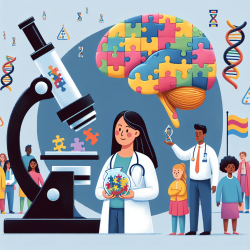Introduction
Genetic testing is becoming a cornerstone in the clinical evaluation of children with Autism Spectrum Disorder (ASD). A recent study titled "Genetic testing including targeted gene panel in a diverse clinical population of children with autism spectrum disorder: Findings and implications" provides valuable insights that can help practitioners improve their diagnostic and therapeutic approaches. This blog will discuss the study's findings and their implications for clinical practice, particularly in the context of racial and ethnic diversity.
Key Findings
The study involved genetic testing of 100 children diagnosed with ASD using microarray, fragile X testing, and a targeted gene panel. Here are some key findings:
- 12% of children had copy number variants (CNVs) believed to contribute to ASD risk.
- Variants in the KIRREL3 gene were identified in 6.7% of children, compared to 2% in the Exome Aggregation Consortium (ExAC) database.
- Rare variants in the TSC2 gene were found to be more common in specific racial/ethnic groups.
Implications for Practitioners
These findings have several implications for practitioners:
1. Importance of Comprehensive Genetic Testing
The study highlights the importance of comprehensive genetic testing, including microarray and targeted gene panels, in identifying genetic factors that may contribute to ASD. Practitioners should consider recommending these tests as part of the diagnostic process.
2. Consideration of Racial and Ethnic Diversity
The study underscores the need for racial and ethnic diversity in genomic databases used for identifying variants that contribute to disease risk. Practitioners should be aware of the potential for misinterpretation of genetic results due to the underrepresentation of certain racial/ethnic groups in these databases.
3. Focus on KIRREL3 and TSC2 Genes
The identification of KIRREL3 and TSC2 variants suggests that these genes may play a significant role in ASD. Practitioners should consider these findings when evaluating genetic test results and may want to stay updated on further research in this area.
Encouraging Further Research
While the study provides valuable insights, it also highlights the complexity of genetic factors in ASD. Practitioners are encouraged to stay informed about ongoing research and consider participating in or supporting studies that aim to improve our understanding of the genetic underpinnings of ASD.
Conclusion
Genetic testing offers significant potential for improving the diagnosis and treatment of ASD. By considering the findings from this study and staying informed about ongoing research, practitioners can enhance their ability to provide data-driven, individualized care for children with ASD.
To read the original research paper, please follow this link: Genetic testing including targeted gene panel in a diverse clinical population of children with autism spectrum disorder: Findings and implications.










